Relationship Spread #1
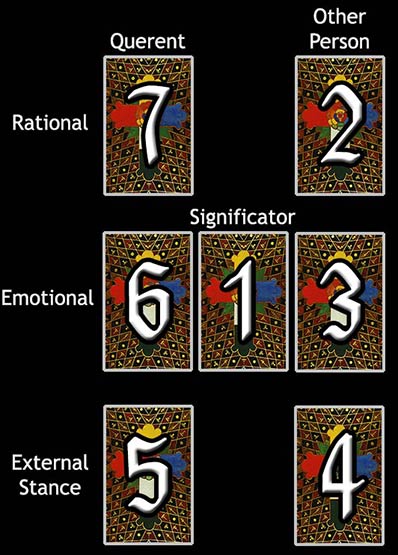
Difficulty: Easy
This tarot spread is easy to read, like a convenient chart. In this spread, court cards generally indicate actual people with the same characteristics. Knights (or corresponding princes, but not kings) and queens are meant to represent actual men and women in this tarot spread. Look for patterns in the cards as always.
Card #1 is the overall significator of the relationship. The two columns on either side of the significator characterise each individual's role in the relationship. The relationship does not have to be romantic. In fact, it could be a relationship between a person and a group, or even how two groups relate.
The top row, cards #7 & #2, is about the conscious thoughts of each person, or what they think about the relationship and likewise how they view their partner.
The middle row, cards #6 & #3, reveals the way each individual feels about the other. Emotional awareness corresponds to a person's unconscious thoughts that run deep, affecting a person in ways he or she is not fully aware of.
The bottom row, cards #5 & #4, represents the way each person behaves, in other words the stance taken regarding the relationship. The way a person acts may be genuine, but sometimes people are phony and manipulative, so it is best to weigh this card against the other person's cards to determine how they match up.
Your Relationship #1 Reading
You |
Other Person |
||
Thought |
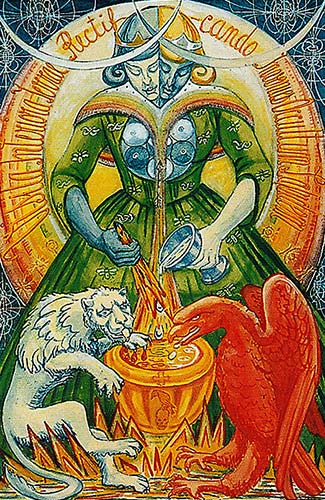 XIV – Art |
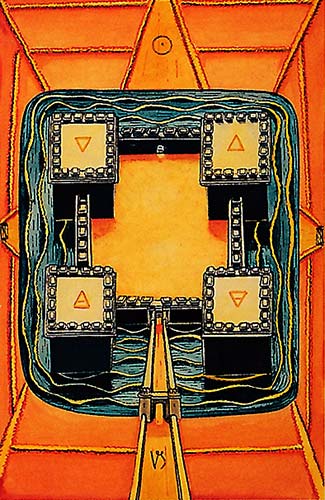 Four of Disks (Power) |
|
Emotion |
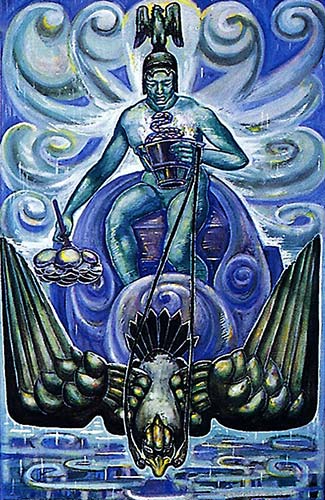 Prince of Cups |
The Significator 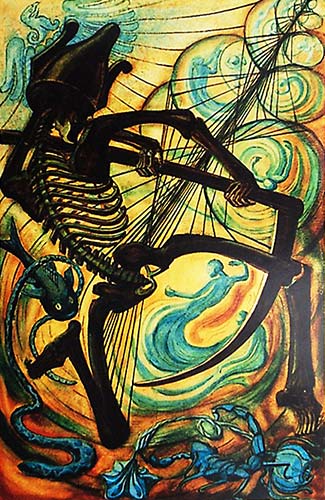 XIII – Death |
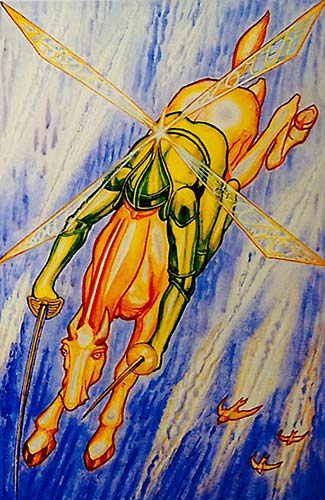 Knight of Swords |
External Stance |
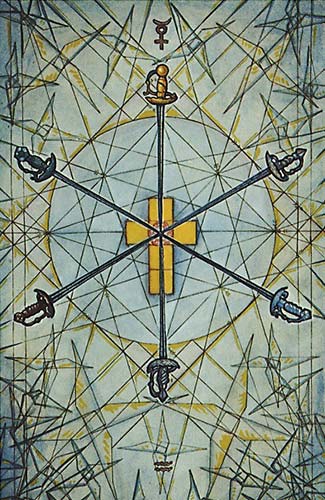 Six of Swords (Science) |
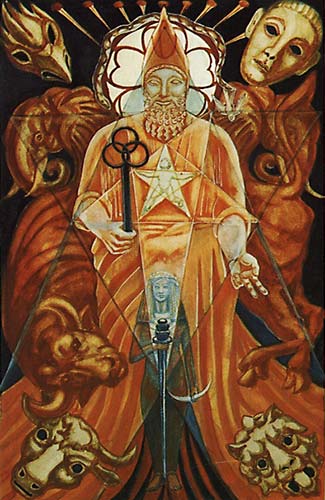 V – The Hierophant |

The Significator
XIII – Death
(Scorpio, Nun)
Death represents transformation, endings, and the profound renewal that arises from letting go. Associated with Nun, the fish, this card symbolises the regenerative cycles of life and the eternal flow of existence. Scorpio, the zodiac of intensity and rebirth, infuses the card with themes of metamorphosis and profound emotional depth.
The figure of Death is a skeletal figure wielding a scythe, harvesting the forms of life to make way for growth. Surrounding him are figures dissolving and reforming, emphasising the continual cycle of destruction and creation. Fish swim in the background, symbolising the life force that persists through change. The overall imagery is dynamic and alive, with a swirling interplay of light and shadow reflecting the transformative energy of this card.
In Relationships: Death signifies the end of a relationship or the transformation of its dynamics. It encourages you to release what no longer serves you, allowing space for growth.
In Work: This card indicates a major transition or the end of a phase. You are advised to embrace change and view endings as opportunities for renewal.
Spiritually: Death symbolises the shedding of old identities and the rebirth of the soul. It calls you to embrace transformation and trust in the process of spiritual evolution.
When ill-dignified: Death warns of resistance to change, fear of endings, or an inability to move forward. You are advised to confront your fears and trust in the natural cycles of transformation.

The Querent's Thoughts
XIV – Art
(Sagittarius, Samekh)
Art, traditionally called Temperance, represents the alchemical process of transmutation and the blending of opposites. Associated with Samekh, the prop, this card signifies the support and structure needed to integrate seemingly opposing forces. Sagittarius, the zodiac of exploration and synthesis, infuses the card with visionary energy and optimism.
The central figure is a radiant androgynous being with two faces engaged in an alchemical act of union. They pour liquid from one vessel into another, blending fire and water, symbolising the merging of opposites to create something entirely new. Around them, symbols of the zodiac and alchemical glyphs emphasise the universal nature of this process. The golden background radiates the light of inspiration and higher purpose, while the stream of power arching above the pot signifies hope and divine harmony.
In Relationships: Art represents the balance and integration of differences. It encourages you to find harmony through patience, communication, and mutual understanding.
In Work: This card signifies success achieved through creativity, innovation, and the ability to blend diverse elements into a unified whole. You are advised to embrace flexibility and trust in your creative process.
Spiritually: Art symbolises the quest for inner balance and the alchemical transformation of the self. It calls you to embrace your contradictions and to unite yourself in service of a higher purpose.
When ill-dignified: Art warns of imbalance, lack of focus, or the inability to harmonise opposing forces. You are advised to recalibrate and approach your challenges with patience and creativity.

The Other Person's Thoughts
Four of Disks (Power)
Astrological Correspondence: Sun in Capricorn
The Four of Disks (Power) represents the solidification and consolidation of material wealth and security. The imagery of four square disks arranged symmetrically evokes stability, emphasising the creation of a solid foundation and the control one has over their material circumstances. This card symbolises the mastery and protection of financial resources and the ability to maintain power and stability in the physical world.
The Four of Disks reflects a time when material security is established, and you are likely in a position of control over your material situation. It highlights the importance of maintaining discipline, focus, and practicality in securing one's wealth, but also warns against the potential rigidity or over-attachment to material possessions. The influence of the Sun in Capricorn encourages a steady, strategic approach to building and preserving wealth, ensuring that power and stability are achieved through responsible, enduring effort. This card represents a moment of mastery in managing one's material world.
In Relationships: The Four of Disks may signify stability and security but can also indicate possessiveness or control. It may suggest that you are focusing on maintaining the material aspects of a relationship, such as financial security, at the expense of emotional depth or freedom.
In Work: The Four of Disks suggests financial stability and control over one's material resources. It indicates success in business or career, particularly through careful management and conservation of resources. The card advises maintaining control and not taking unnecessary risks with financial matters.
Spiritually: The Four of Disks may suggest that you are focusing too much on the material or outward manifestations of spirituality and not enough on inner growth. It may be a reminder to let go of the need for control and allow more freedom and flow in your spiritual practice.
When ill-dignified: The Four of Disks represents a fixation on materialism, greed, or possessiveness. You may be too conservative with your resources, unable to let go of control. It can indicate insecurity masked by an outward appearance of power, or the inability to adapt to changing circumstances.

The Querent's Emotions
Prince of Cups
Element: Air of Water
Astrological Correspondence: Scorpio
The Prince of Cups represents the dynamic interplay between intellect and emotion, where Air's exploratory nature merges with Water's depth and intensity. As Air of Water, he embodies a figure of emotional complexity and intellectual curiosity, driven by a quest for deeper meaning and truth, pulled by an eagle. He is depicted as a charioteer navigating turbulent waters, holding a cup that symbolises his pursuit of emotional and spiritual insight.
This card highlights the active force of intuition and the transformative power of emotions guided by intellectual focus. The Scorpio influence intensifies his inner depth, imbuing his journey with passion, determination, and a willingness to explore the unknown realms of the heart and soul.
The Prince of Cups invites you to harness your emotional wisdom and channel it into meaningful action. While his intensity and curiosity can lead to profound insights and transformative experiences, he also cautions against becoming consumed by emotional extremes or illusions. He inspires you to balance your emotional depth with clarity and purpose, pursuing your desires with confidence and integrity.
In Relationships: The Prince of Cups represents someone idealistic, emotionally expressive, and perhaps on a quest for love or emotional fulfilment. This card can indicate someone emotionally open but who may be swept away by their emotions or desires for romantic ideals.
In Work: The Prince of Cups can point to a career path that requires creativity, intuition, and emotional intelligence. He may represent a person who uses their emotional depth and insight to drive their professional goals or a time when you are pursuing a career that aligns with your emotional passions and desires. However, the Prince also suggests ensuring you stay grounded, as you could become distracted by your emotional dreams or ideals.
Spiritually: The Prince of Cups speaks to an emotional journey where intuition and feelings guide you. This card indicates you are on a spiritual quest to connect more profoundly with your emotions and intuitive wisdom. It suggests a time of emotional exploration propelled by intellectual curiosity and the search for higher truths.
When ill-dignified: The Prince of Cups can indicate emotional instability or a tendency to act impulsively based on fleeting feelings. You may become overly idealistic, leading to disillusionment when reality doesn't align with your fantasies. There may also be a tendency to escape into emotional distractions, rather than facing challenging feelings head-on.

The Other Person's Emotions
Knight of Swords
Element: Fire of Air
Astrological Correspondence: Gemini
The Knight of Swords represents an intense, fast-moving force of intellect and action. He charges through the air with fierce determination, embodying the quick, forceful qualities of Air in motion. The Knight's swift movement symbolises his drive to deliver ideas and messages, pushing forward with unrelenting focus and mental energy. His actions are rapid and decisive, like a whirlwind of thought and communication, sometimes chaotic in their intensity.
This card signifies the action-oriented aspect of the Air element—taking intellectual concepts and turning them into tangible actions. However, the Knight of Swords can also represent the dangers of rushing forward without considering the consequences. His speed and energy may sometimes lead to hasty decisions or the need to reconsider the path after action has already been taken.
The Knight of Swords challenges you to embrace your intellectual power and take bold action but also reminds you of the need to temper that drive with caution, ensuring your pursuit of ideas does not lead to unintentional harm or misdirection. His energy encourages directness but warns against impatience.
In Relationships: The Knight of Swords can signify sudden and forceful communication or an intellectual attraction that dominates the emotional connection. Relationships may progress rapidly, but arguments or disagreements may also mark them if the parties involved are not careful in their approach. The Knight can indicate the need for quick, clear communication, but also suggests avoiding impulsive, hurtful words.
In Work: The Knight of Swords represents a fast-paced, intellectually driven professional environment. This is a person determined to achieve success by force of will, intellect, and swift action. However, this card can indicate that you might need to slow down and consider the consequences of your actions before you rush ahead. It's easy to become caught up in the speed of success and miss important details.
Spiritually: The Knight of Swords symbolises a quest for intellectual enlightenment, often seeking truth and knowledge through sharp analysis. This card can indicate a sudden spiritual awakening or an urge to rush towards spiritual goals but also warns that the pursuit of intellectual clarity can overshadow emotional or intuitive wisdom.
When ill-dignified: The Knight of Swords indicates impulsive, reckless behaviour driven by hasty thoughts and actions. You may rush into situations without thinking them through, leading to chaos or conflict. It's important to exercise caution and avoid becoming too forceful or aggressive in pursuing goals. This card can also point to misunderstandings or cutting words that cause damage to relationships or situations.

The Querent's External Stance
Six of Swords (Science)
Astrological Correspondence: Mercury in Aquarius
The Six of Swords depicts six swords arranged to form a Rosicrucian Cross, symbolising mental clarity, focus, and intellectual transformation. The swords point inward towards the centre, reflecting a concentration of mental energy aimed at achieving insight and resolution.
This card represents a transition from confusion to clarity, with the influence of Mercury in Aquarius highlighting a shift towards rational thinking and progressive ideas. It signifies overcoming mental challenges and moving towards a more enlightened perspective through intellectual discipline and mental evolution.
In Relationships: The Six of Swords can signify moving on from emotional turmoil or difficult situations. It suggests healing and transition, where you are leaving behind emotional baggage or moving towards a calmer, more peaceful state. It may indicate that it's time to let go of old wounds in love and seek a more rational and clear-headed path forward.
In Work: The Six of Swords suggests transition, possibly involving a move to a new job or a shift in career direction. It indicates mental clarity and the ability to leave behind old limitations, signalling a fresh approach to work. It may also suggest a time to travel or seek new opportunities that bring growth.
Spiritually: The Six of Swords represents a journey of enlightenment, where you are moving towards greater understanding or higher wisdom. It suggests confusion or emotional struggle is being left behind, and you are embarking on a path towards spiritual clarity.
When ill-dignified: The Six of Swords may indicate resistance to change or being stuck in a transition that isn't moving forward. It could suggest that you are struggling to leave behind mental baggage or remain mired in confusion, even when there are opportunities for progress. This card can warn against avoidance, where you refuse to move on or face the challenges of change.

The Other Person's External Stance
V – The Hierophant
(Taurus, Vav)
The Hierophant is a figure of sacred knowledge and spiritual authority, acting as the bridge between the divine and the mundane. Linked to Vav, the nail, he unites opposing forces and secures the sacred connection between heaven and earth. Taurus, the zodiac sign of stability and sensuality, lends him an enduring, earthy strength.
The Hierophant is depicted as a commanding figure robed in red, symbolising spiritual power and divine authority. He stands as a bridge between the divine and material realms. A large pentagram glows on his chest, signifying mastery over the elements and sacred knowledge. He holds a three-ringed sceptre, representing dominion over body, mind, and spirit. The Egyptian priestess beneath him suggests hidden wisdom or esoteric teachings. Surrounding him are symbolic beasts—the bull of Taurus, an elephant, and four cherub masks—reinforcing themes of strength, structure, and initiation into higher knowledge. The composition conveys mystical revelation, initiation, and the channelling of sacred truths.
In Relationships: The Hierophant suggests relationships guided by shared values, spiritual connection, and mutual growth. It emphasises the importance of trust, commitment, and alignment in beliefs.
In Work: This card speaks to mentorship, tradition, and the power of established systems. It advises you to seek wisdom from trusted sources and honour the tried-and-true methods that lead to success.
Spiritually: The Hierophant represents initiation into higher knowledge and the sacred mysteries. He invites you to seek wisdom from spiritual teachings and align your actions with divine will.
When ill-dignified: The Hierophant warns against dogmatism, blind adherence to tradition, or excessive reliance on external authority. You are advised to discern whether you are following your spiritual truth or conforming to others' expectations.